Our future is on fire: It’s time to choose where to stand
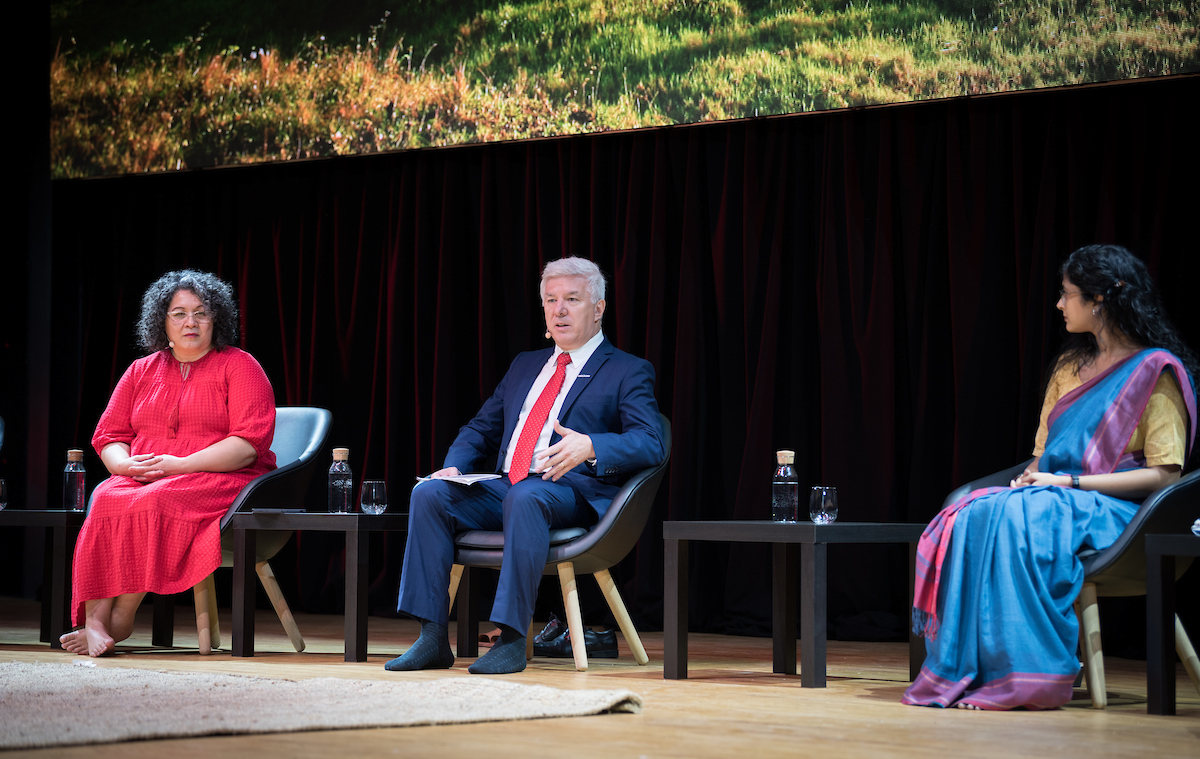

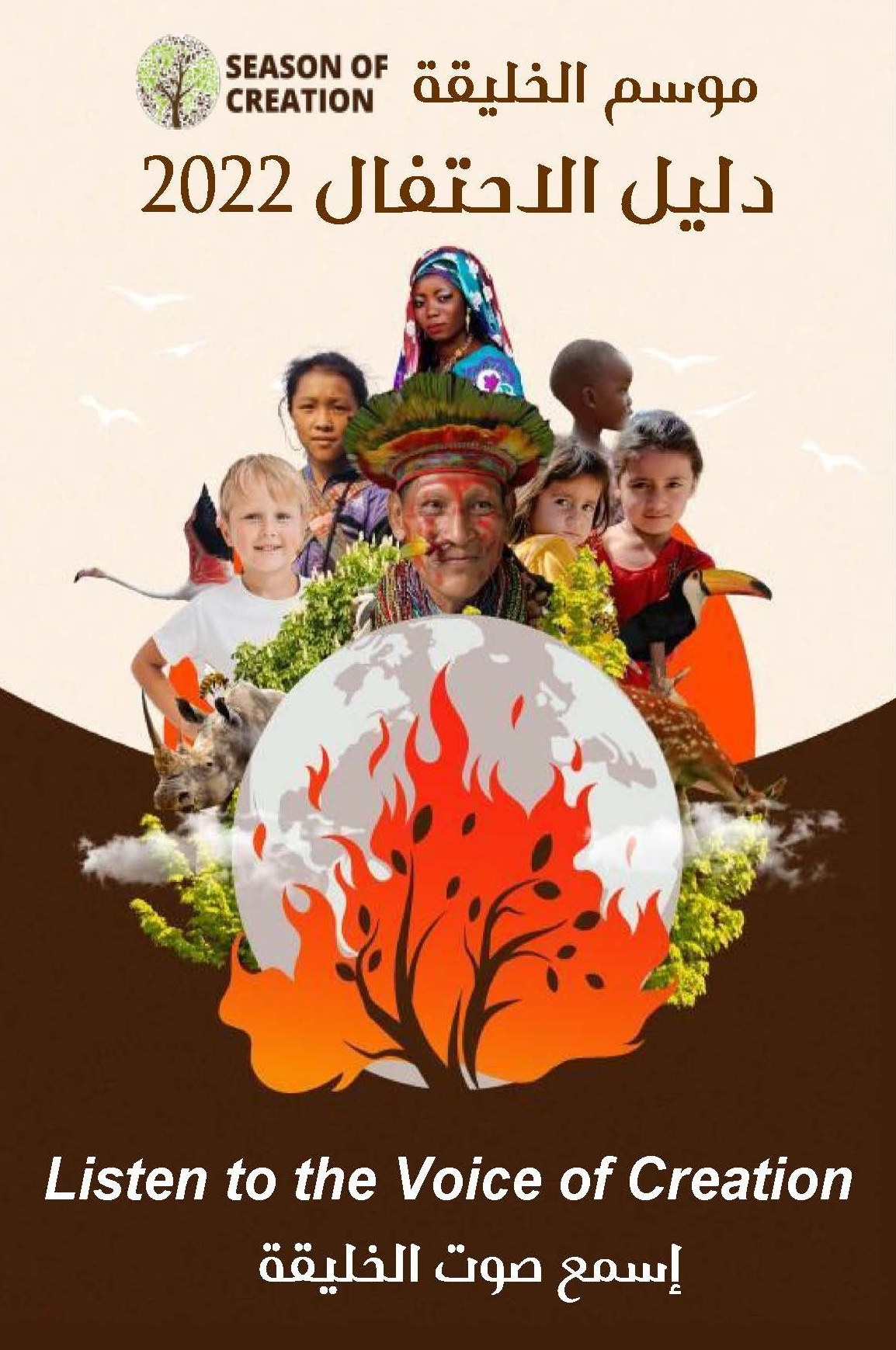
The Middle East Council of Churches (MECC) has embarked on a wide-ranging Season of Creation campaign this year. Thanks to their efforts, the Season of Creation Celebration Guide has been translated into Arabic, and is available on their website along with Spanish and English versions. MECC is also planning a series of activities to mark the Season of Creation, which begins September 1, the Day of Prayer for Creation, and ends October 4, the Feast of St. Francis of Assisi, the patron saint of ecology.
“Our campaign includes prayer services in the entire Middle East with Egypt, Jordan, Syria, and Lebanon as highlights,” says Rev. Dr. Rima Nasrallah of MECC’s Eco-Justice Unit and a member of ACT’s Governing Board. “There are also youth-oriented activities and forestation projects.” Short videos, podcasts and interviews will be aired on regional television and social media.
To find out more about Middle East Season of Creation activities, follow the hashtag #SeasonOfCreationME on Twitter (MECC, @MECChurches) and Facebook (@MECChurches). ACT’s Twitter account will share MECC’s Season of Creation activities.
The Season of Creation begins on September 1 with a global prayer service streamed on YouTube (English: ask to be notified here; Spanish; Italian and other languages). The Season of Creation Celebration Guide is available in several languages in addition to Arabic through the pulldown menu of languages on the Season of Creation homepage. Churches around the world are engaged in hosting activities, which you can read about here.
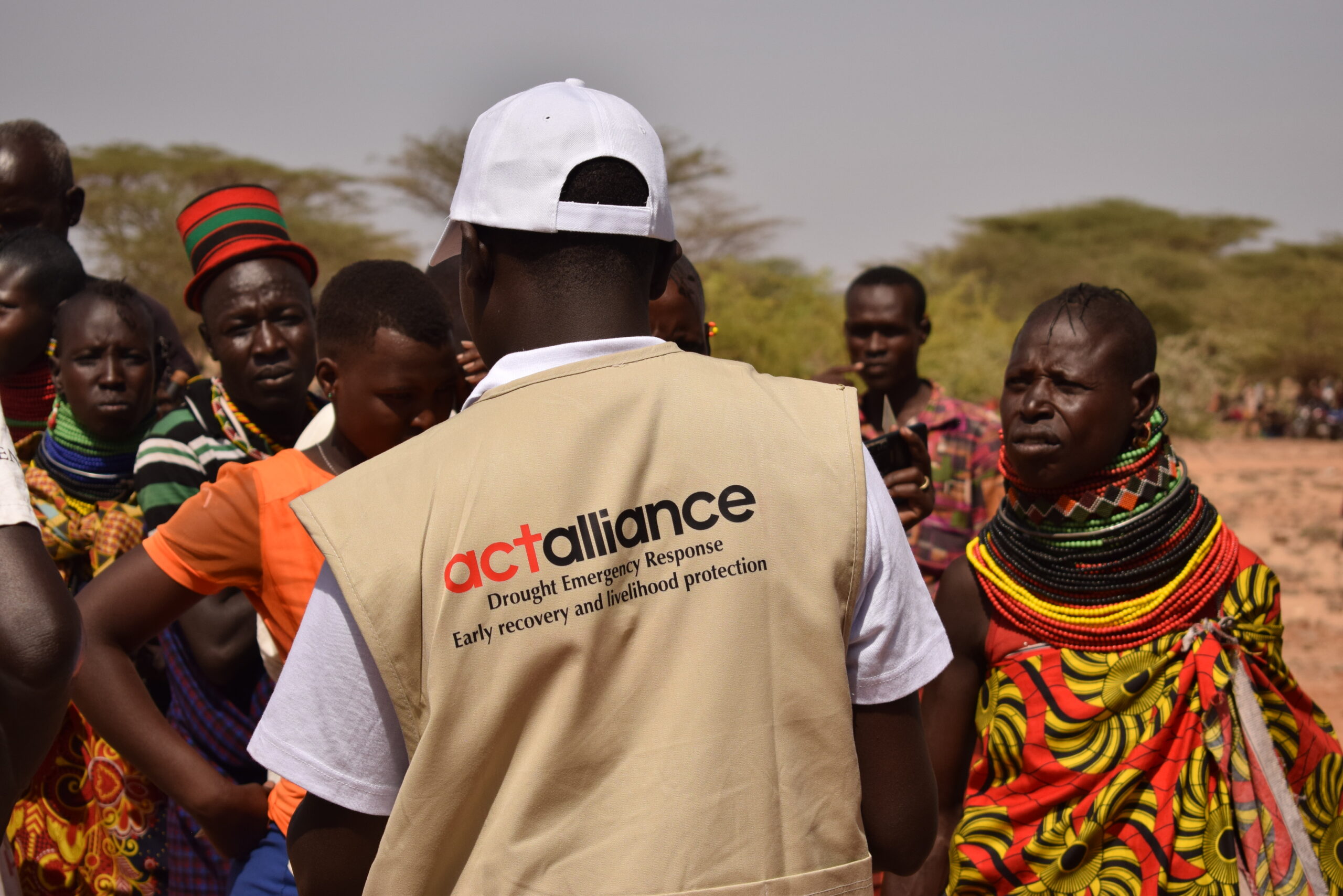
ACT Alliance Nordic members gathered in Oslo 25 August, and state the following:
In an increasingly fragile world, where billions are facing conflict, increased poverty, food insecurity and climate disaster, we urge the Nordic countries to be champions of joint and bold action for global solidarity and sustainability.
We are deeply concerned about the multiple crises facing us all but hitting the most vulnerable people in the world the hardest. The number of people in need of development and humanitarian aid is the highest since World War 2. Moreover, the increased pressure on human rights, gender equality, and democracy in many countries deteriorates the situation.
Therefore, we urge the Nordic countries to strengthen their cooperation, and unite to champion and protect values such as human rights, democracy, equality, and inclusion, values that are strong in the Nordic region, but are under immense pressure globally. We call for the Nordic countries to be brave and innovative and gather around increased, concrete and joint action to protect these values. The Nordic countries are already deeply committed to human rights, democracy, and sustainability, but increased joint action is needed. A rules-based, international world order, supporting human rights, accountability and multilateral cooperation, is essential to uphold, also for the Nordic countries.
We also urge the Nordic countries to uphold high commitment to development and humanitarian aid, ensuring that official development assistance is of high quality, predictable and with a strong commitment of leaving no-one behind in realisation of the Sustainable Development Goals. Also, we urge the Nordic countries to ensure that global common goods, such as vaccines, domestic refugee costs and climate financing is funded from other and additional sources, and not the aid budgets. Rich countries must be innovative in securing diversity in funding to handle national and global crises, focusing on engaging the private sector. Otherwise, the Global Sustainability Goals will not be met.
ACT Alliance Nordic members that participated in the meeting were Dan Church Aid (DCA), Finn Church Aid (FCA), ACT Church of Sweden, Norwegian Church Aid (NCA) and Icelandic Church Aid (ICA).
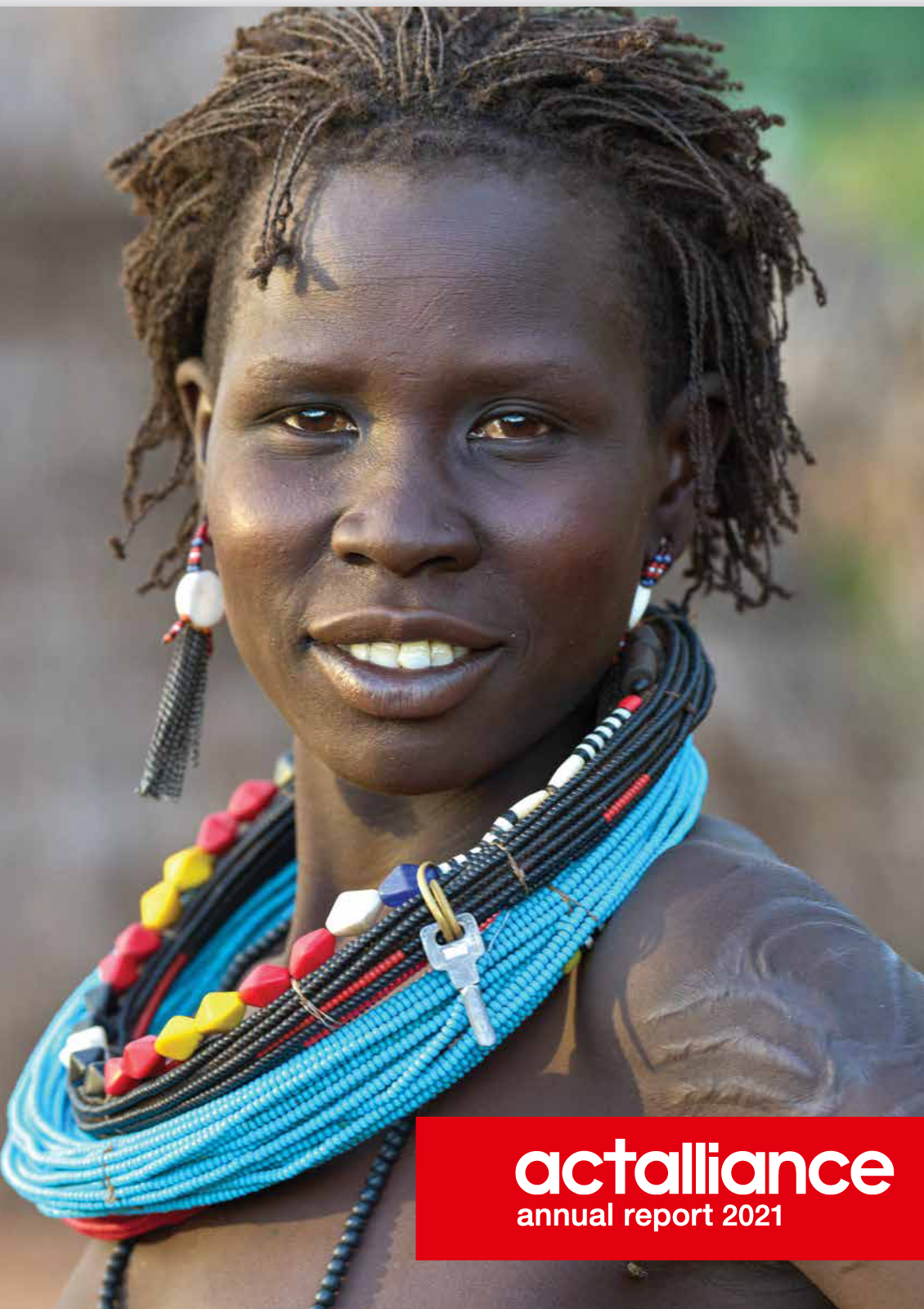
The 2021 ACT Alliance Annual Report is now available in English, French and Spanish.
“The Alliance has a unique ability to hold space for difficult discussions within the ecumenical movement, and to listen deeply to communities which have been silenced,” says Rudelmar Bueno da Faria, ACT General Secretary in his message. “Our common ground is rooted in our diakonal involvement and our faith. This gives us the energy we need to face the challenges of our time.”
This issue features special interviews on ACT’s gender and humanitarian programmes along with reports on the Electronic General Assembly, ACT governing board elections, ACT Goodwill Ambassadors and youth engagement. Read about the work of the ACT regions and the 2021 activities of the Climate Justice, Migration and Displacement and other ACT programmes.
We hope you enjoy this review of 2021.
Download your copy here:
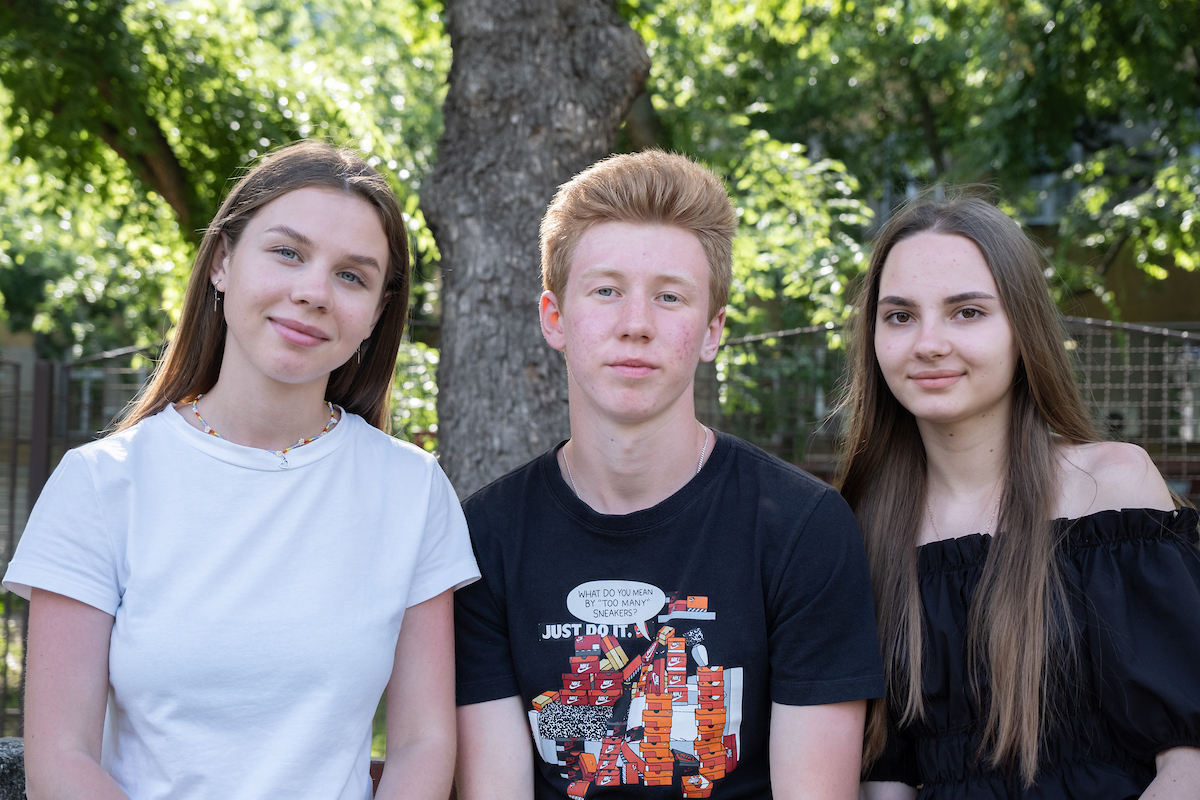
Six months ago, on February 24, 2022, the Russian invasion of Ukraine began. ACT members have been responding to the needs of those impacted by the war since the beginning. We’ve provided for the immediate and longer term needs of those displaced within Ukraine and those who’ve fled into surrounding countries.
The ACT Appeal for Ukraine has raised over $20M USD so far towards the $23.5M USD requested by the four members (AIDRom, HEKS, Hungarian Interchurch Aid and Lutheran World Federation) who are part of the appeal. ACT members are also responding bilaterally and through their own programming. To date, they have reached over 700,000 people through their programmes.
The impacts of the war are being felt around the world through the energy crisis and food insecurity brought on by the geopolitical situation. Tens of millions are at risk of starvation in Africa this year due to droughts and the loss of grain normally imported from Ukraine. ACT is calling on humanitarian actors and donors to support other humanitarian crises (Afghanistan, Tigray, Venezuela, Yemen, Syria, Sudan, and many others) just as robustly.The work in and around Ukraine has been strong. ACT members have provided shelter, food, clothing, employment support, legal and language support, psychosocial and spiritual support, and much more to many of the 13 million people displaced by the war.
ACT members’ expertise in refugee support enabled them to help assist third country nationals fleeing the escalating conflict. Ionut Zota, AIDRom staff in Iasi, was contacted by the Tunisian embassy to help 250 Tunisians return home. “They had to be gathered from all over, and then sent by bus from Iasi to Bucharest. We helped them find accommodation while they were gathering. The churches provided them with food for the three days they were in Iasi as well,” said Ionut.
Churches have been at the forefront of the response.. As part of the community, churches are engaged for the long haul and can respond quickly and in a sustained way to people’s needs. Clergy also meet people’s spiritual needs, offering prayer and support. Father Eugen Omu is a Romanian Orthodox priest who staffed a refugee welcome centre in Sculeni, Romania. “It is important to have priests here,” he said. “When someone sees a priest, it reminds them of God and gives them courage to face what is to come.”
ACT members will continue to support those displaced by the war as long as there is need. Plans are underway for key issues such as how to provide safe, warm, and dignified accommodation during the winter months. and ensuring children’s access to education while schools are being used as refugee and IDP shelters.
ACT members continue to be proactive in adapting their programmes to meet refugees’ current needs. Hungarian Interchurch Aid opened border welcome points in the early days for those driving and walking across the border, transitioned to supporting those arriving by train shortly thereafter, and have now opened a centralised refugee hub in Budapest to make it easier to meet refugees’ needs . They continue to analyze needs and patterns and adapt their approach to serve the refugees.
LWF has opened several cash support centres in Poland, providing refugee families with money to meet their basic needs. HEKS provides the basics of life (food, water, hygiene, etc.) to families in some of the oblasts where fighting remains intense, including Mykolaivska, Khersonska, Zaporizka and Kharkivska.
As the war drags on, the needs will not diminish in Ukraine, nor in other parts of the world. To support ACT’s appeals, please contact Niall O’Rourke, head of humanitarian affairs, at niall.orourke@actalliance.org.
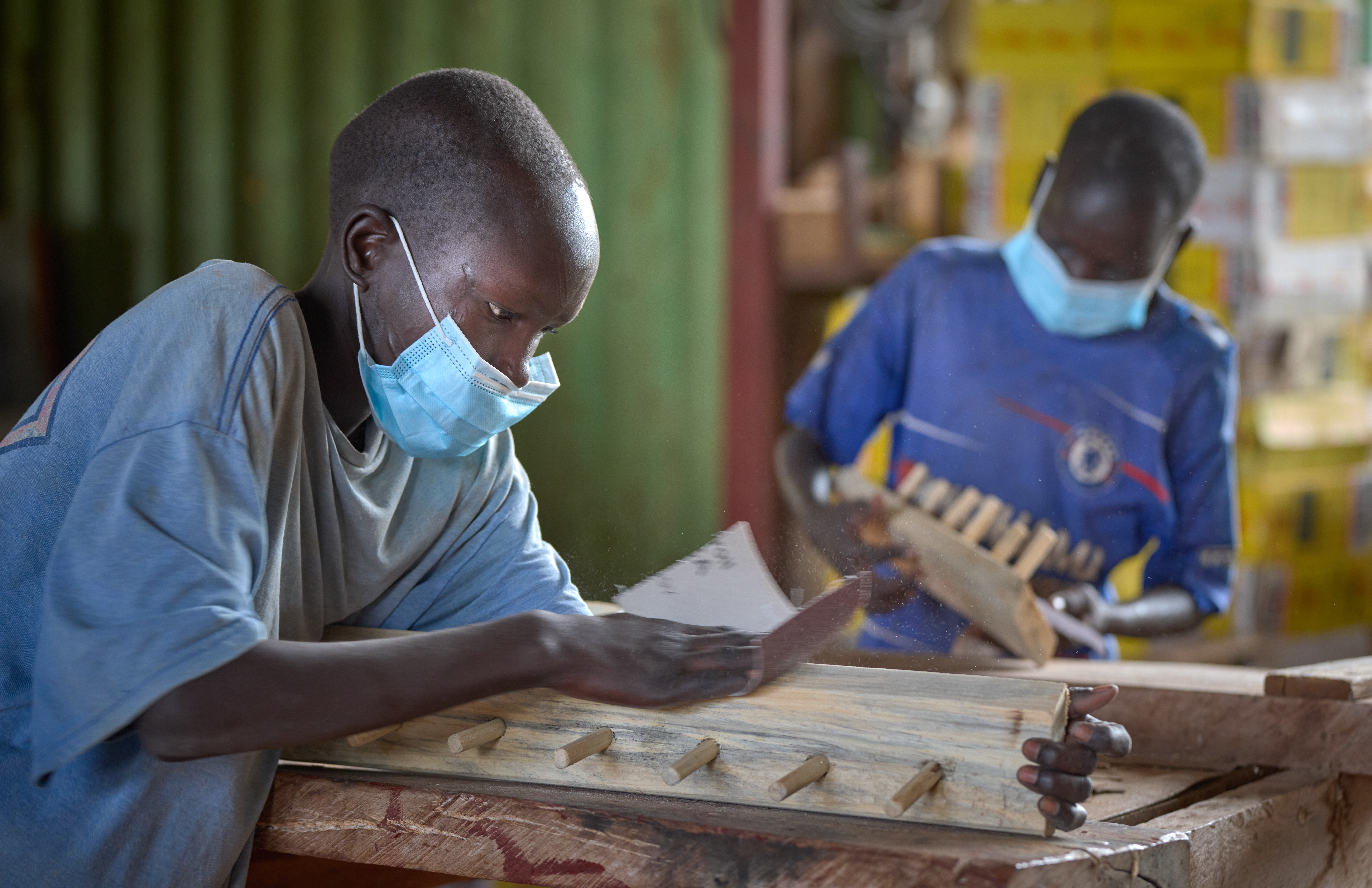
Between 5th and 15th of July this year, the United Nations held its annual High-level Political Forum (HLPF) on Sustainable Development. ACT’s regional youth representative for Africa Jeronime Obwar from Young Women Christian Association (YWCA) -Kenya attended virtually by sharing her thoughts during a side event organized by the Alliance of NGOs and CSOs for South-South Cooperation (ANCSSC) and ACT Alliance parallel event.
The side event, was hosted on Friday 8th by Deloitte at their office in Rockefeller Centre in New York and virtually via Zoom, with the theme; “Building back better from the coronavirus disease (COVID-19) while advancing the full implementation of the 2030 Agenda for Sustainable Development ”.
“The first 25 weeks of the onset of COVID-19 set us back 25 years in terms of progress made in terms of gender equality and empowerment of marginalized communities” she said
Ms. Jeronime amplified the key role of youth inclusion in decision making processes, leadership as well as implementation of the2030 agenda. With the impact of the Covid-19 pandemic , she pointed out that Youth represent a critical solution in addressing these issues brought about by the pandemic
Ms. Jeronime noted the need to enhance partnerships and collaborations as key focus on SDG17, giving youth opportunities to share their learnings, experiences, expertise and them giving space to implement innovative ideas them.
“When youth are empowered, we are ready to change the world” she said
The virtual event showcased best practices and lessons learned on South-South cooperation to accelerate progress for sustainable development in the context of building a sustainable, inclusive, and resilient recovery from the COVID-19 pandemic as well as addressing on-going issues of vaccine hesitancy, challenges of delivery, fair allocation, and supply of vaccines to fragile and vulnerable settings through multi-stakeholder cooperation with CSOs in the Global South.
On this years’ international youth day, ACT Alliance continues to promote inclusion of youth in governance, programme planning as well as implementation.
Want to receive updates from the ACT Alliance Youth Participation Community of Practice? Subscribe to their newsletter today! Click here to subscribe
By Christian Wolff
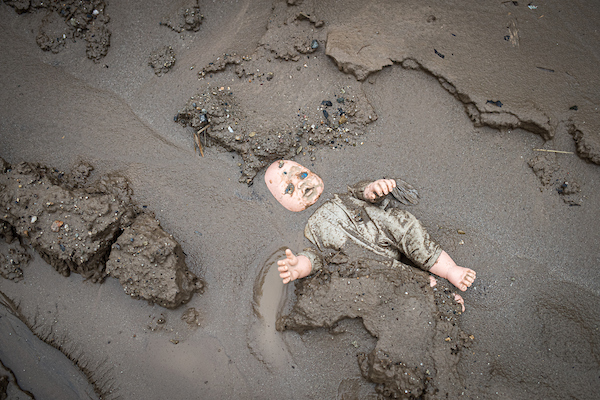
ACT Alliance and its members participated in the International Migration Review Forum (IMRF) in New York this spring. We spoke to Mercedes Perez of Honduras ACT member CASM (Mennonite Social Action Committee) about the impact of climate change on migrant women in Central America, and about the results of the IMRF. CASM assists returning migrant women with skills training and reintegration. They also work with national authorities on disaster response, often with support of ACT appeals.
Central America, especially Honduras, is highly vulnerable to climate change. In addition to hurricanes, communities suffer from droughts and floods. Mining concessions and Honduras’ form of development contribute to communities’ displacement from their lands. Once rural communities, particularly Indigenous ones, lose their livelihoods they try to migrate. A significant number of migrants are unsuccessful and forced to return. Returning migrant women, especially Indigenous women, are often unable to recover their land. They suffer the most from the plundering of natural resources and the absence of land rights.
This is an edited version of the interview, which can be found at the end of this article.
Climate change and women’s migration
Mercedes: Because of its geographic location Honduras is very vulnerable to the effects of climate change, as is all Central America, but Honduras is most affected by storms. Families who have lost their livelihoods, have joined the famous migratory caravans, which are now much larger and stronger.
Climate change has led to more frequent and more intense natural disasters. This has had a direct impact on people, primarily women and their families. They are forced to look for a migratory route. Most of them chase the American dream.
The policies of our countries don’t respond fairly to people’s needs. Every day we see women and families lose their livelihoods.
Little protection for migrants
When women go on that migration route, they are exposed to human trafficking. The risk is high. A family, a woman, obliged to leave our country, is at high risk because they have no protection system, and they may end up in prostitution. Boys and girls on that route are also at high risk.
We ask countries to provide more protection and some humanitarian aid. We want the United States to provide work visas and regularise the status of migrants affected by the storms Eta and Iota so they can work there and recover the livelihoods they lost.
International Migration Review Forum
At this Forum we talked about the review; about progress on agreed objectives for a safe, orderly and legalised migration; about climate change; and about states’ commitments. We believe it is rhetoric.
Much more is needed; more commitment as well as more investment. Above all, the industrialised countries, these powers which most harm the planet, should make commitments to the so-called Third World populations.
Mining increases migration
In these underdeveloped countries communities have always cared for their environment. But governments are the main ones that have been selling our territories.
In Honduras, many families are displaced by mining concessions and open-pit mining. Some areas are being sold as special employment and economic development zones. Indigenous peoples, the ones who have looked after these areas, are forced to migrate. There is more economic interest in exploiting resources than in protecting the planet.
We have protected these resources, and now we are the most affected. The great powers are not interested in protecting them.
Looking forward
They could give carbon credits to those who preserve the environment, to provide a living for them. If I live in a region with a big, beautiful forest and I look after it, someone could compensate me for protecting it. There’s a long way to go. We need a serious commitment from governments.
We need stronger partnerships, solid commitments and guarantees that investments will reach the people. Women must be able to reclaim their land and Indigenous peoples to use resources responsibly.
Harmony with nature
We could have harmony in the world and with nature. We could narrow existing gaps, the clear gap between women, Indigenous peoples, youth and the effects of climate change. These gaps should be narrowing, but they grow wider every day.
Our approach at CASM will always be protecting people and the environment and establishing a direct relationship with governments and other agencies to increase our effectiveness. We commitment is to children, women, subsistence farmers and people living at the margins who need assistance.
Christian Wolff is the ACT Alliance Programme Manager for Migration and Displacement
<div style=”padding:56.25% 0 0 0;position:relative;”><iframe src=”https://player.vimeo.com/video/735893702?h=26a54ae22c&badge=0&autopause=0&player_id=0&app_id=58479″ frameborder=”0″ allow=”autoplay; fullscreen; picture-in-picture” allowfullscreen style=”position:absolute;top:0;left:0;width:100%;height:100%;” title=”Migration, climate and gender in Honduras”></iframe></div><script src=”https://player.vimeo.com/api/player.js”></script>
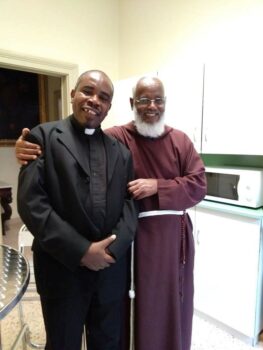
From 18th-20th July , The ACT Angola forum convened a regional drought and hunger southern region advocacy conference which was held in Lubango, Huila province. The conference was aimed at addressing the prolonged drought in Angola’s southern region provinces of Namibe, Huila, Cunene and Cuando Cubango provinces. As food stocks are depleting, the situation has deteriorated and it is predicted to worsen during the next lean season when traditionally food stocks run low. Humanitarian assistance until the next harvest is therefore needed to prevent further deterioration.
“When I wake up every morning, I see people gathering at our local church. They say the only place they feel safe, respected and receive something is at the church. I receive a lot of people, especially the elderly, women and children” says the Catholic priest ,Father Jacinto Pio, at Chiange local church in Huila province. They say “we have faith and hope but our flesh is weak”. I remember when I advocated to the ACT Angola forum in mid-2012 when the crisis started, to visit the southern region to see for themselves. “we managed to do something together as faith-based organizations who put the vulnerable communities at the Centre of all what we do”.
We have established a coalition of civil society organizations “Plataforma Sul” which is monitoring and advocating with well-wishers and the government to accept and recognize this situation as a humanitarian crisis. The impacts of drought will not end in five years . People need immediate support in all sectors to ensure safeguarding their livelihood and remain in their areas of origin.
Every year between June and December, people move within the province, outside the province and migrate to neighboring countries in Zambia and Namibia. The elderly and women are left behind after their children and family members migrate. This situation leaves to be more vulnerable to all sorts suffering. These people need immediate support and protection. Children stop schooling to go and search for food and water, and even look after their parents.
The situation has not improved but worsened extending to other provinces of Namibe and Cuando Cubango. The central region has been hit also since last year. “Let us not joke with climate change and its impact. Let us protect the creation so that in turn we live peace with it. This is our obligation instructed by God in the Bible”, says the Catholic priest during the drought and hunger southern region advocacy conference supported by ACT Angola Forum in July held in Lubango, Huila province.
The ACT forum members in Angola are appealing for more support and funding to support vulnerable communities affected by the prolonged drought. The main sectors are food security, Water, Sanitation and Hygiene (WASH), Livelihoods, Preparedness and Prevention, Shelter and Households NFI, Gender and Advocacy.
written by Mr. Abrao Mushivi ,National Country Director for LWF Angola and ACT Angola forum Appeal Lead
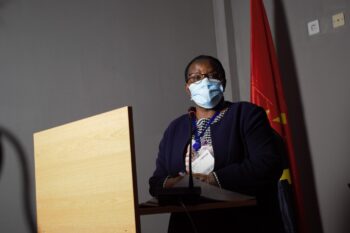
Angola is experiencing the worst drought in 40 years resulting in poor harvests and rising food prices have resulted in an acute food insecurity in Angola’s southern region provinces of Namibe, Huila, Cunene and Cuando Cubango provinces. As food stocks are depleting, the situation has deteriorated and will likely worsen during the next lean season when traditionally food stocks run low. Humanitarian assistance is until the next harvest is needed to prevent further deterioration. Since January 2021, an estimated 3.81 million people have been reported to have insufficient food consumption in the six southern provinces of the country, namely Cunene, Huíla, Namibe, Huambo, Benguela and Cuanza Sul. Angola’s main IDP camp in Kaluheke, Cunene province received more than 7,800 people after months of hunger and water shortage in their respective areas. Another estimate of 16,000 people those that were repatriated from the Republic of Namibia.
“We are in the middle of hunger crisis. Drought impact and hunger is not a story but something visible to everybody” says the Provincial Vice Governor during the southern region conference opening speech in Lubango, Huila province southern Angola. This is the third regional conference after two others which were conducted in the south and at national level in Luanda in March and October 2021 respectively. All these conferences have been conducted by the Angolan civil society organizations (Plataforma Sul) a network/coalition composed of several CSOs supported by LWF Angola.
The Lutheran World Federation, (LWF), Norwegian Church Aid (NCA) and the Council of Christian Churches in Angola (Conselho de Igrejas Cristã em Angola – CICA) are members of the ACT Angola Forum. The two organizations (LWF and NCA) have well established programmes in Angola and share a vision of fighting poverty and exclusion by working with local churches and rights-based approaches and to promote a life with dignity for all.
On 1st April 2022, the ACT Angola Forum launched an appeal (ANG-221) for joint efforts towards responding to the drought impact crisis, strengthening of civil society organisations, faith-based institutions and local leaderships including government institutions. The ACT Angola Forum Drought Appeal under ACT Alliance appeal mechanism is implemented by the Lutheran World Federation, Norwegian Church Aid and Conselho das Igrejas Cristã em Angola (CICA).
The main response sectors are food security, Water, Sanitation and Hygiene (WASH), Livelihoods, Preparedness and Prevention, Shelter and Households NFI, Gender and Advocacy.
Read more about the ACT Appeal for Angola Drought Response and consider supporting.
Article by Mr. Abrao Mushivi ,National Country Director for LWF Angola and ACT Angola forum Appeal Lead
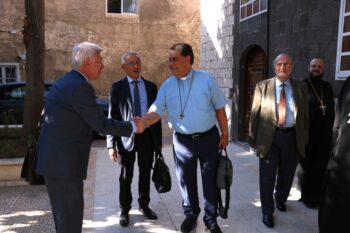
ACT’s general secretary, Rudelmar Bueno de Faria joined a delegation from the World Council of Churches (WCC) visited Syria for the first time since 2008, expressing solidarity with Christians and with all people facing the struggle for a presence and witness in their land.
The delegation, led by WCC acting general secretary Rev. Prof. Dr Ioan Sauca, also included Dr Michel Abs, secretary general of the Middle East Council of Churches (MECC) and Michel Nseir, WCC senior advisor for peace building.
They met with heads of WCC and ACT member MECC member churches, and visited restored churches and schools as well as development projects and community and health centres in Old Aleppo and in Damascus.
After the visit, Bueno de Faria said, “After 11 years of war, the Syria crisis is characterized by unparalleled suffering and humanitarian needs. Economic distress caused by the sanctions is affecting ordinary people, especially youth and the elderly.“
He added, “Churches and church-related organizations are providing humanitarian assistance, but urgent political decisions and actions are needed to revert the suffering of the Syrian people. Human dignity needs to be restored in Syria.”
Sauca said the WCC stood in solidarity with Christians in Syria and in the whole region as they struggle continuously to keep a living faith in the midst of unprecedented challenges that threaten their presence and witness. “There should be an ecumenical effort to support them in their steadfastness,” said Sauca. “One of the major challenges particularly felt by Christians in Syria is that being fewer in number makes them more vulnerable than other communities in facing common challenges in their societies.”
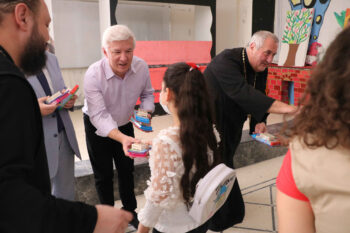
Young people are migrating to look for a better future abroad, said Sauca, a tide that churches and humanitarian groups could help turn around. “Christians in Syria have developed institutions that specialise in humanitarian and development fields that are serving all people without any discrimination,” he said. “In addition to the schools, medical, health and community centres, psycho-social services are provided, and small businesses are supported.”
The delegation also saw that many destroyed churches and schools have been rebuilt. “This contributes to encourage people to remain steadfast in their land,” said Sauca.
Dr Michel Abs, secretary general of the Middle East Council of Churches, stressed “the need for a meeting between spiritual leaders at the local, diocesan and pastoral levels, aiming at increasing the level of interaction between churches and coordinating their activities.“
This story is based on the WCC’s release here: https://www.oikoumene.org/news/wcc-delegation-visits-syria-expresses-solidarity-with-those-who-remain-steadfast-in-their-land.